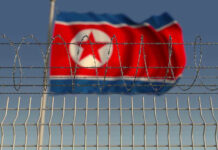Amidst a century-old border dispute, Thailand and Cambodia’s diplomatic relations have reached a boiling point, leaving the region on the brink of chaos.
At a Glance
- Thailand and Cambodia have recalled ambassadors amidst a severe border dispute.
- The conflict was triggered by a landmine incident that injured a Thai soldier.
- Both countries have escalated military presence along the border.
- Over 40,000 people have been displaced due to recent clashes.
Escalation of Long-Standing Tensions
The border between Thailand and Cambodia has long been a contentious line of discord, often flaring up over historical disputes and territorial claims. The latest spark in this already volatile relationship was a landmine explosion in July 2025, which seriously injured a Thai soldier near the Chong Bok and Chong An Ma areas. Thai authorities were quick to point fingers at Cambodian forces, accusing them of violating international law and Thai sovereignty.
In response to this incident, Thailand’s government, led by Prime Minister Phumtham Wechayachai, decided to close all northeastern border crossings with Cambodia. This action was mirrored by Cambodia, which closed its checkpoints and halted essential imports like fuel and gas from Thailand. The situation escalated as both nations recalled their ambassadors, a diplomatic move that underscores the severity of the current crisis.
Key Stakeholders and Their Roles
The primary stakeholders in this crisis include the governments of Thailand and Cambodia, local communities along the border, and international organizations monitoring the situation. The Thailand government, under the leadership of Prime Minister Phumtham Wechayachai and Lt Gen Boonsin Padklang, seeks to protect its sovereignty and respond to domestic demands for a tough stance against perceived aggressions. Meanwhile, Cambodia, led by Prime Minister Hun Manet, aims to assert its territorial claims and protect national pride.
Local communities are caught in the crossfire, facing displacement and economic instability as border closures disrupt trade and daily life. On the international front, organizations like the United Nations and ASEAN are watching closely, ready to offer mediation assistance if requested. However, their influence is limited, as both nations hold firm control over their military operations and diplomatic strategies.
Current Developments and Consequences
As of July 2025, the situation has deteriorated significantly. On July 23rd, Thailand’s 2nd Army Region ordered the closure of all border crossings in Surin, Sisaket, and Buriram, effectively halting trade and tourism. This move was followed by the expulsion of the Cambodian ambassador. In retaliation, Cambodia took similar actions, exacerbating the already tense atmosphere.
The most alarming development occurred on July 24th, when armed clashes between Thai and Cambodian troops resulted in at least 12 deaths, mostly civilians, and displaced over 40,000 people. The humanitarian impact is enormous, with ongoing efforts to provide aid to those affected by the violence. Both governments have raised military alertness, and diplomatic communications have been reduced to official channels only.
Implications and Expert Perspectives
The immediate impact of this border dispute is a humanitarian crisis, with thousands displaced and local economies severely disrupted. Long-term implications could include entrenched hostilities and regional instability, as historical grievances deepen and future reconciliation becomes more difficult. The ongoing threat of landmines complicates efforts to demarcate and develop the border region effectively.
Security analysts caution that while a full-scale war is unlikely, recurrent skirmishes and diplomatic stalemates are probable due to the entrenched grievances and weak leadership in both countries. Humanitarian organizations stress the urgent need for mine clearance and civilian protection, while international observers call for de-escalation and dialogue. The key to resolving this crisis lies in finding a balance between national pride and the need for regional stability and humanitarian protection.
Sources:
2025 Cambodia–Thailand border conflict











